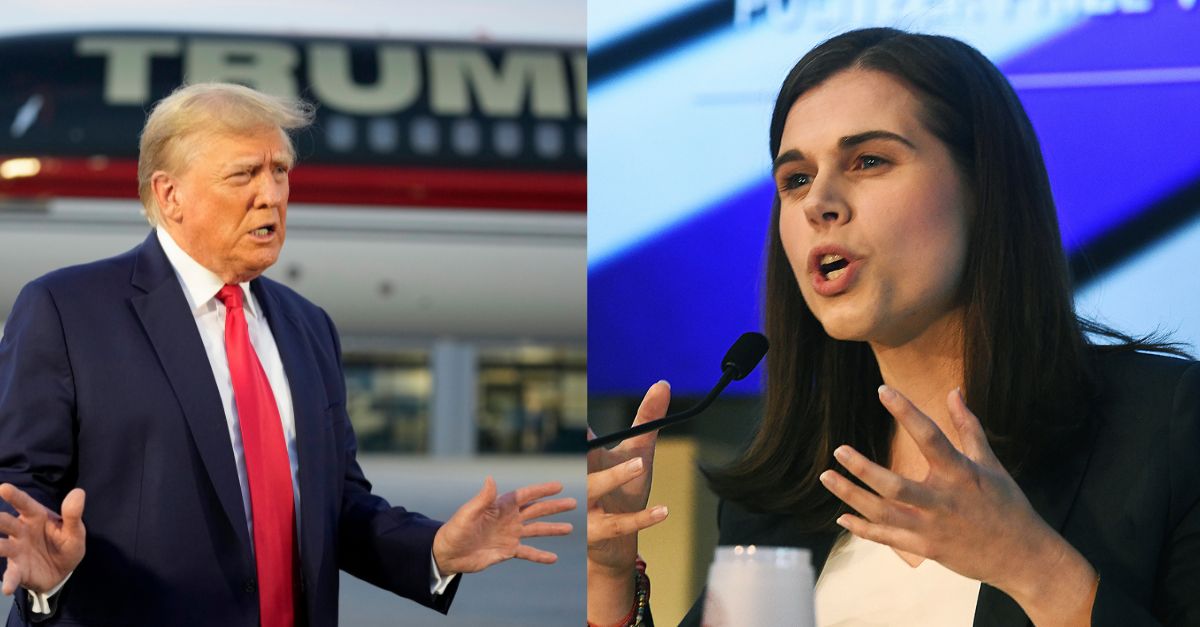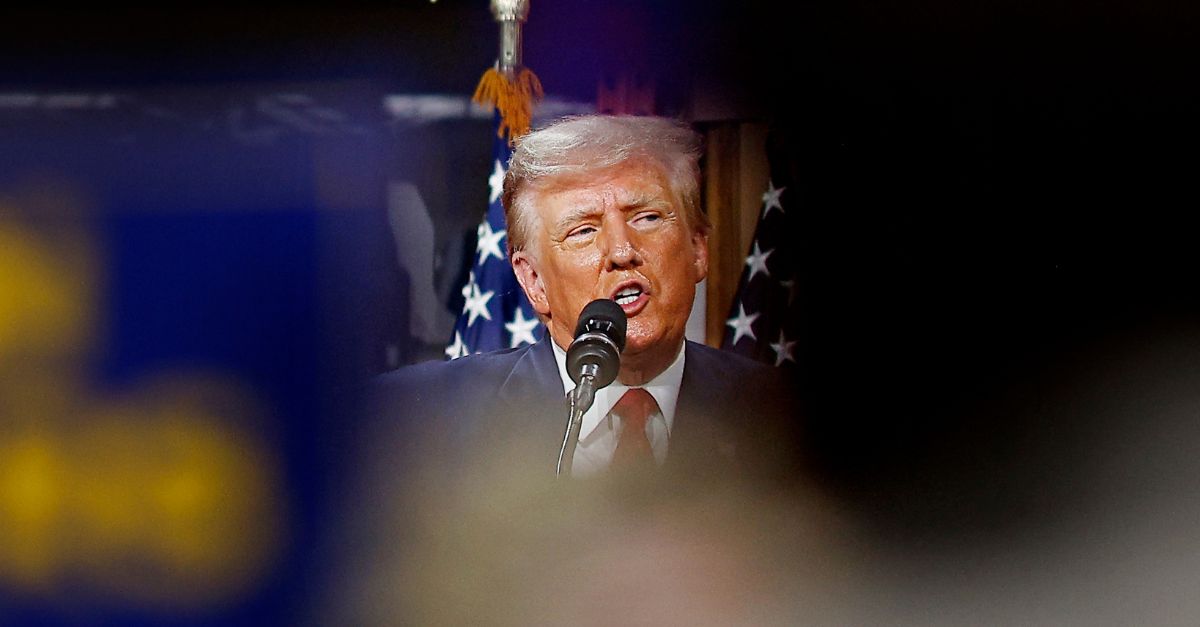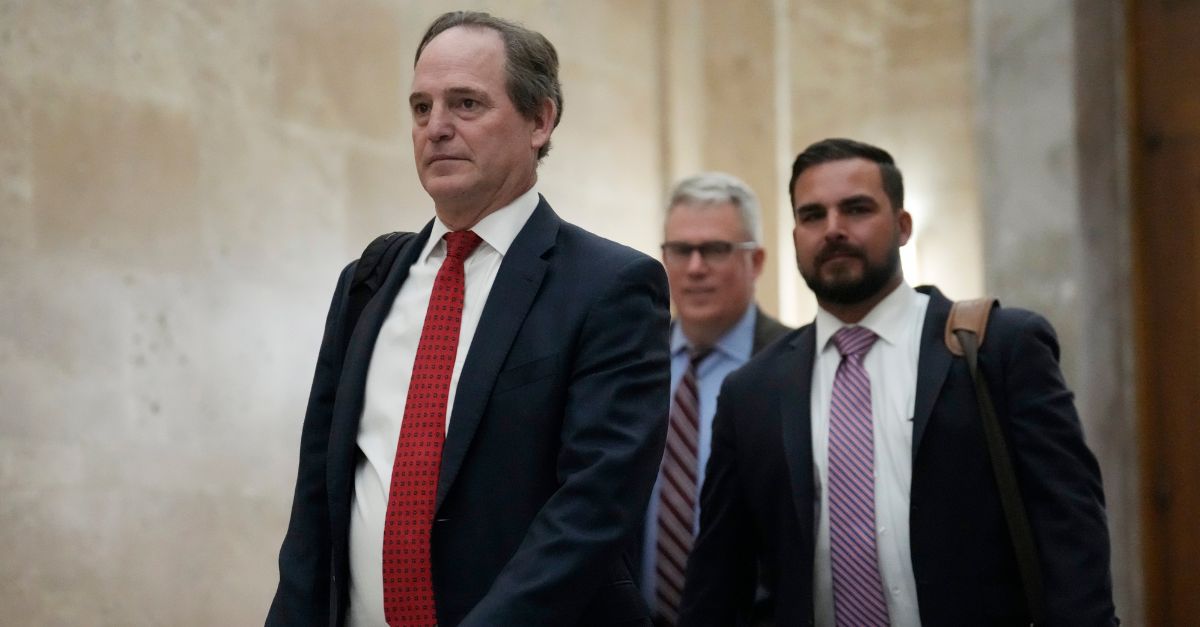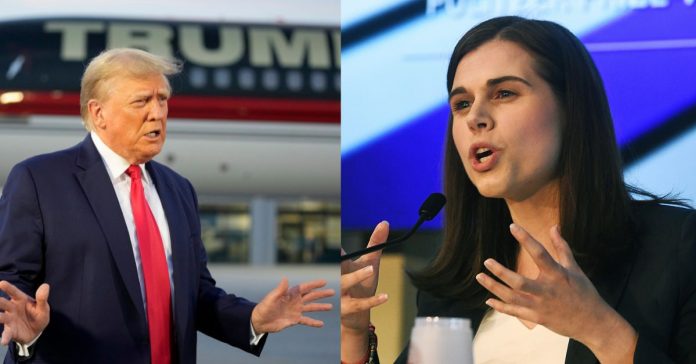
Left: Former President Donald Trump speaks with reporters before departure from Hartsfield-Jackson Atlanta International Airport, Aug. 24, 2023, in Atlanta (AP Photo/Alex Brandon, File). Right: Colorado Secretary of State then-candidate Jenna Griswold, D-Colo., speaks during a debate at the Penrose House in Colorado Springs, Colo., on Saturday, Oct. 13, 2018 (Jerilee Bennett/The Gazette via AP).
In Colorado on Monday morning, a trial will get underway that could determine whether former President Donald Trump will remain on the ballot there in 2024 after a group of mostly Republican voters challenged his qualifications to serve by alleging he violated his oath to the Constitution when he fomented insurrection on Jan. 6, 2021.
The former president’s lawyers, including Geoffrey Blue, will go toe-to-toe against attorneys from the watchdog group Citizens for Responsibility and Ethics in Washington (CREW) when proceedings begin Monday morning.
Trump is not expected to be in the Mile High State as proceedings stretch through the end of this week. The former president is currently defending himself against civil fraud charges in New York, where he also faces criminal charges, while other indictments trail behind him in Florida, Georgia and Washington, D.C.
Section III of the Fourteenth Amendment is at the center of trial arguments. The Civil War-era provision bars oath-breaking insurrectionists from holding office, and it has rarely been enforced, though it is considered a foundational part of the nation’s democratic structure.
In Colorado, voters represented by CREW and Trump’s attorneys are expected to duke it out over the definitions of “insurrection,” and they will debate whether Trump’s activities such as pressuring state officials, scheming to promote unsanctioned electors in an effort to overturn results and providing “aid and comfort” to armed rioters who stormed the U.S. Capitol by urging them to “fight like hell” should amount to his disqualification from holding any public office, let alone the U.S. presidency.
Trump has repeatedly tried and failed to dismiss the case. Over the last several weeks, he has claimed the petition seeking his removal by Colorado Secretary of State Jena Griswold, is an attempt to politically persecute him. He has argued the insurrection clause “does not apply” to the president and does not stop someone from running for office. He has criticized Griswold as a “never-Trumper” and tried — and failed — to align her with the petitioners because of her alleged bias.
He unsuccessfully argued for dismissal on First Amendment grounds, arguing the case aims to chill his right to exercise his speech and political activity. He has claimed the case should never have been heard in the courts because his removal from the state ballot is not a decision for a judge to make, but only Congress or the Electoral College.

Former President Donald Trump speaks in Clinton Township, Mich., Wednesday, Sept. 27, 2023. (AP Photo/Mike Mulholland)
Second Judicial District Judge Sarah Wallace has strongly disagreed with Trump’s lawyers on that point and others, telling the former president last week that if she were to take his suggestion that a political candidate or party without any oversight could nominate a person to office regardless of any restriction or wrongdoing, then things would promptly become “absurd.”
“The Constitution and its requirements for eligibility are not suggestions left to the political parties to determine at their sole discretion,” Wallace wrote.
After three days of hearing either side, Wallace will render a decision in November. From there, it is a near certainty that the matter will be appealed by one or the other side, and then it will head to the U.S. Supreme Court, where a currently Trump-appointed majority controls the bench.

An attorney for former President Donald Trump, Geoffrey Blue, left, leaves a courtroom after arguing against a lawsuit that seeks to keep Trump off the state ballot Friday, Oct. 13, 2023, in district court in Denver. (AP Photo/David Zalubowski)
There will also be evidence presented Monday from experts called by Griswold to discuss what ability she does or does not have to add or remove candidates from a ballot. Wallace has rebuffed motions from Trump seeking to answer this before trial got underway, specifically telling the former president she wished to hear from the secretary first.
CREW is not the only group challenging Trump’s right to remain on the ballot in light of his conduct around Jan. 6. Another group in Minnesota, Free Speech for the People, will see arguments in that matter get underway beginning November 2.
In Michigan, according to Michigan Public Radio, a judge there recently refused to throw out a lawsuit seeking to remove him from the ballot in that state. Trump is not named in the suit by the voters who brought it. They have sued Secretary of State Jocelyn Benson only, asking her to remove his name from the ballot in 2024 election due to his alleged violation of Section III. Benson has said she will not remove Trump from the ballot short of a court order.
Trump has denied any wrongdoing around the events of Jan. 6,
This story is developing.
Have a tip we should know? [email protected]

